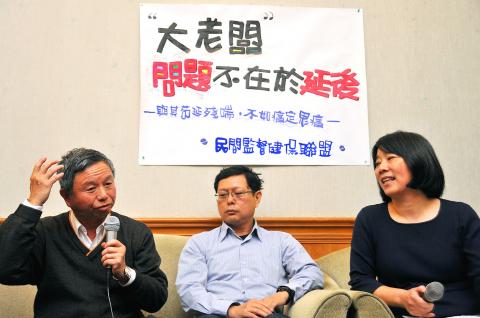If the government wants to make the second-generation National Health Insurance (NHI) program fair it should scrap the supplementary premiums mechanism and charge a premium based on household incomes, civic groups and academics said yesterday.
The critics, including former health minister Yaung Chih-liang (楊志良), told a press conference that regulations on premium calculations should be revised so that premium fees are proportional to income.
Implementation of the second-generation NHI program, which is scheduled to take effect in July, will reportedly be postponed until January next year because of concerns about its financial viability.

Photo: Chien Jun-fong, Taipei Times
The supplementary premiums, which were added to the new NHI program in January last year after the National Health Insurance Act (全民健康保險法) was amended, use different rates for various groups and income categories, and would make the new program more unfair, Taiwan Women’s Link president Huang Shu-ying (黃淑英) said.
Yaung, who saw the law amended before stepping down in February last year, said he had always insisted that the premium calculation should be based on total household income, but the legislature’s Finance Committee overturned the Social Welfare and Environment Hygiene Committee’s proposal at the last minute.
“The supplementary premium was adopted because the Finance Committee had failed to respect the proposal of a more professional committee and more than 100 experts,” he said, adding that some lawmakers “should have avoided a conflict of interest,” without elaborating.
The former minister said he was in a painful dilemma in January last year.
“If the law was not amended in time, I was not sure if it would be amended at all. At the same time, I knew the amended legislation was far from what I had hoped for,” he said.
Yaung said he still hoped the new program would be implemented sooner rather than later, because the new program benefits the underprivileged and women more than the current insurance scheme.
The former minister also said that, despite the claims made in a Ministry of Finance statement, a formula based on total household income was feasible and lawmakers should try to amend the law before the current legislative session concludes.
Explaining why the supplementary premium mechanism is unfair, National Health Insurance Civic Surveillance Alliance (NHICSA) convener Sun Yu-lien (孫友聯) said that while jobs in certain categories carry a premium of 1.47 percent, wages for part-time jobs, which are usually held by poorer people, would be charged at 2 percent.
“It is also ironic that, under the new program, a jobless person would end up paying a higher premium than someone with a monthly wage of under NT$40,000 and an underprivileged kid working in a convenience store would have to pay the supplementary premium if his working hours exceeded a certain threshold,” Sun said.
NHICSA spokesperson Eva Teng (滕西華) said the new premium regime would “neither broaden the premium base, streamline the administrative procedure nor increase premium revenue” for the government.
As the financial status of the NHI program would remain healthy at least until the end of this year and the presidential election has been concluded, Teng said it was now a good time to relaunch discussion of premiums based on household income.

US President Donald Trump said "it’s up to" Chinese President Xi Jinping (習近平) what China does on Taiwan, but that he would be "very unhappy" with a change in the "status quo," the New York Times said in an interview published yesterday. Xi "considers it to be a part of China, and that’s up to him what he’s going to be doing," Trump told the newspaper on Wednesday. "But I’ve expressed to him that I would be very unhappy if he did that, and I don’t think he’ll do that," he added. "I hope he doesn’t do that." Trump made the comments in

NOT AN OPENING: Trump’s violation of international law does not affect China’s consideration in attacking Taiwan; Beijing lacks capability, not precedent, an official said Taiwanese officials see the US’ capture of the president of Venezuela as a powerful deterrent to Beijing’s aggression and a timely reminder of the US’ ability to defeat militaries equipped with Chinese-made weapons. The strikes that toppled Venezuelan President Nicolas Maduro signaled to authoritarian leaders, including Chinese President Xi Jinping (習近平), US President Donald Trump’s willingness to use military might for international affairs core to US interests, one senior official in Taipei’s security circle said. That reassured Taiwan, the person said. Taipei has also dismissed the idea that Trump’s apparent violation of international law could embolden Beijing, said the official, who was not

A cold surge advisory was today issued for 18 cities and counties across Taiwan, with temperatures of below 10°C forecast during the day and into tonight, the Central Weather Administration (CWA) said. New Taipei City, Taipei, Taoyuan and Hsinchu, Miaoli and Yilan counties are expected to experience sustained temperatures of 10°C or lower, the CWA said. Temperatures are likely to temporarily drop below 10°C in most other areas, except Taitung, Pingtung, Penghu and Lienchiang (Matsu) counties, CWA data showed. The cold weather is being caused by a strong continental cold air mass, combined with radiative cooling, a process in which heat escapes from

Snow this morning fell on Alishan for the first time in seven years, as a strong continental cold air mass sent temperatures plunging across Taiwan, the Central Weather Administration (CWA) said. The Alishan weather station, located at an elevation of about 2,200m in central Taiwan, recorded snowfall from 8:55am to 9:15am, when the temperature dropped to about 1°C, the CWA said. With increased moisture and low temperatures in the high-altitude Alishan area, the conditions were favorable for snow, CWA forecaster Tsai Yi-chi (蔡伊其) said. The last time snow fell at the Alishan weather station was on Jan. 10, 2018, while graupel fell there